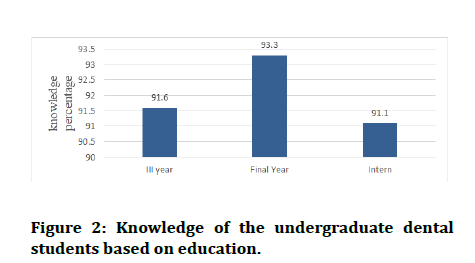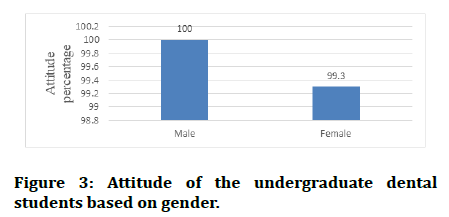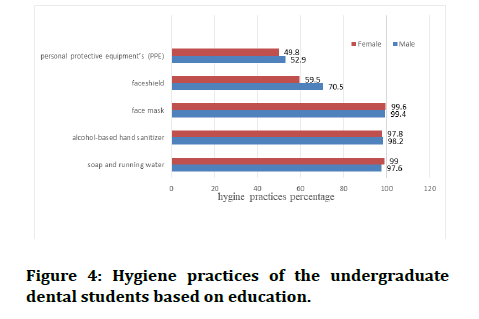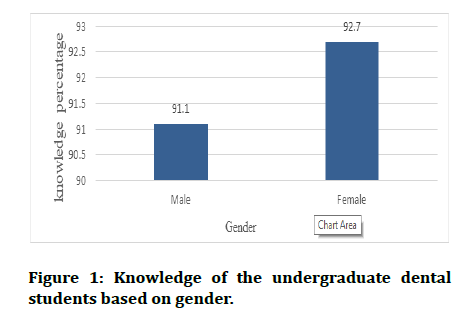Review Article - (2022) Volume 10, Issue 9
COVID-19: Knowledge, Attitude and Hygiene Practices among Undergraduate Dental Students in Jaipur District
Satyendra Singh*, Naganandini S, Kumar Gaurav Chhabra, Pankaj Chaudhary, Sakshi Shukla, Jahanvi Kapadiya and Avishek Singh
*Correspondence: Dr. Satyendra Singh, Department of Public Health Dentistry, NIMS Dental College and Hospital, Jaipur, Rajasthan, India, Email:
Abstract
Introduction: Severe Acute Respiratory Syndrome Corona Virus-2 (SARS-CoV-2 or COVID-19) is a global public health emergency. Post a COVID managing and treating patient has become a major cause of concern for health care professionals all over the world. Dental specialists are taken into consideration to be at excessive risk, as maximum dental remedy tactics can cause to unfold of contamination because of the direct proximity with saliva, blood and era of aerosols.
Aim: To assess the knowledge, attitude and hygiene practices among undergraduate dental students regarding COVID-19 in Jaipur district.
Methodology: A web based survey was conducted among 3rd and 4th BDS students and Interns of all dental colleges of Jaipur district. The questionnaire was divided into four parts like socio-demographic (5), knowledge (11), attitude (7) and hygiene practices (5). Chi square test was applied and statistical significance level was set at p<0.05.
Results: Overall 499 undergraduate students responded, among them 35.1% were male and 65.9% are females. The final year BDS students (93.33%) had better knowledge as compared to Interns and third year students and the difference was statistically significant. Males showed positive attitude as compared to female students. Interns (75.73%) were more concerned about hygiene practice. which is likewise statistically significant.
Conclusion: Among the undergraduate dental students who responded, females and final year BDS students had better knowledge. The male participants showed positive attitude as compared to female students and the preventive practice measures except for face shield which was least used among third year students.
Keywords
COVID-19, Knowledge, Attitude, Hygiene practices, Undergraduate students
Introduction
COVID-19 (Corona virus Disease, 2019 and SARSCoV-2) caused by a new member of the corona virus family called novel corona virus, is a newly discovered emerging respiratory disease. COVID-19, an acronym derived from the terms CORONA virus disease and the year of discovered in 2019. The epidemic of the disease which introduced in the month of December 2019 in Wuhan region of China has become one of the major health problems for human and is claiming thousands of lives every day across the globe. It was in early 2020 that WHO confirmed it as a pandemic [1].
The corona virus is spherical in shape and made up of outer lipid layer and crown of club-shaped spikes, with single-stranded RNA as their genetic material. The most commonly symptoms are asthenia, myalgia’s, nasal congestion, rhinitis, pharyngotympanic, and especially a dry cough and dyspnoea with fever. Old age and patients with co-morbidity like hypertension, cardiac disease, lung disease, cancer, or diabetes are more prone to develop the disease. The incubation period of the disease ranges from 5 to 14 days during which symptoms may not be confirmed [2].
This virus is transmitted from person-to-person through inhalation of aerosols from an infected individual and touching an infected person. Primary preventive measures include regular hand sanitizing, social distancing, and respiratory hygiene involving covering of face during coughing or sneezing. Healthcare professionals are at the frontline of COVID-19 pandemic response and are exposed to dangers like pathogen exposure, long working hours, psychological distress, exhaustion, physical disaster and occupational burnout. Dental professionals and students are especially vulnerable due to their proximity to symptomatic or asymptomatic patients and their oral fluids [3]. During their daily practice; dentists use rotary instruments such as hand-pieces or ultrasonic scalars with water cooling systems and air water syringes.
The Centre for Disease Control and Prevention (CDC) and the World Health Organization (WHO) have proposed the general guidelines for prevention of spread of COVID-19 [4]. Where include Get Vaccinated, Wear a mask, regular hand washing, keep social distance each other etc. Till now in step with WHO various versions of SARS-COV virus had been mentioned like Alpha united kingdom, Sep. 2020, Beta south Africa, may also 2020, gamma– brazil, Nov. 2020, delta India, oct.2020, Omicron South Africa, nov.2021 globally [5].
In the present study, knowledge regarding the prevention and control of COVID-19 transmission is essential for dental students to improve the preparedness and response actions. Therefore, this study aimed to assess the knowledge, attitude and hygiene practices among undergraduate dental students regarding the COVID-19 pandemic.
Materials and Methods
Configuration: The present study is a cross sectional study.
Duration: Study done in between September 2021 to October 2021.
Study area: The present study was conducted in all dental colleges of Jaipur district.
Methodology
Study population: A web based survey was conducted among 3rd year and 4th year BDS students and Interns of all dental colleges of Jaipur district.
Study tools: It was designed in English language.
The questionnaire was divided into 4 sections and had a total of 28 questions.
• Section 1 contained socio-demographic details.
• Section 2 contained a total of 11 multiple choice questions for assessing knowledge score regarding COVID-19. For example, which virus causes COVID-19 and where was the first case of COVID-19 identified.
• Section 3 contained a total of 7 attitude based questions which was assessed on 5-point Likert scale (strongly agree, agree, do not know, disagree and strongly disagree). For example should we undergo infection control training in dentistry for COVID-19 and should we personally procure extra PPE for use in the dental clinic to prevent the spread of COVID-19
• Section 4 contained a total of 5 questions to assess their hygiene practices, with Yes & NO answer choice. For example do you cover your face with a face shield and do you wear/use Personal Protective Equipment’s (PPE).
The age of the participants was distributed as: 19-21 years, 22-24 years and 25-27 years. Education of the participants was classified as 3rd year, 4th year and intern dental students.
Sample population, sample size and sampling technique: The whole population of undergraduate third years, final years and inters students from all dental colleges were considered in the present study.
Inclusion criteria: Third year, final year and intern UG dental students were included in present study.
Exclusion criteria: Those who did not respond (not submitting Google form) even after reminders were excluded.
Ethical clearance: The ethical approval was obtained from NIMS University, Jaipur, and Rajasthan. The ethics committee reviewed and approved this study protocol, participant information sheet, and informed consent form and survey questionnaire.
Study procedure: The study was designed as a crosssectional web based survey. Prior to the start of the study, the questionnaire was designed, pretested on 35 postgraduate students of Nims dental college and hospital, validity and the reliability was assessed. The chronbach’s alpha was 0.72. The data was collected through an online questionnaire using Google forms and then distributed through whatsApp groups of UG students which were created by their colleges for academic purpose.
Statistical analysis: All data were collected and coded in Microsoft Excel sheet. Each correct answer in relation to the knowledge of COVID-19 was scored one point.
The analysis was done using IBM SPSS Statistical (Chicago, IL) version 20.0. Chi square test was applied and statistical significance level was set at p<0.05.
Results
Total of 499 responses was received. The study population consisted of a total of 170 (34.1) male students and 329 (65.9) female students. Among the received responses, 168 participants were (33.7%) 3rd year students, 195 (39.1%) were 4th year students and 136 (27.3%) were interns (Table 1).
| N (%) | ||
|---|---|---|
| Age group | 19-21 | 131 (26.2) |
| 22-24 | 307 (61.5) | |
| 25-27 | 61 (12.2) | |
| Gender | Male students | 170 (34.1) |
| Female students | 329 (65.9) | |
| Education | BDS 3rd year | 168 (33.7) |
| BDS 4th year | 195 (39.1) | |
| Intern | 136 (27.3) | |
| College Name | Govt. Dental college | 4 |
| Mahatma Gandhi dental college and hospital | 59 | |
| Rajasthan dental college and hospital | 125 | |
| NIMS dental college and hospital | 220 | |
| Jaipur dental college | 57 | |
| Eklavya dental college and hospital | 34 |
Table 1: Socio demographic data of the study participants.
Knowledge while assessing the knowledge score between male and female participants it was found that the females had good knowledge score as compared to males and the difference was found to be statistically significant (p=0.00), (Table 2). Whereas among all the dental students who participated, the final year BDS students (93.33%) had better knowledge as compared to Interns and third year students and the difference was statistically significant (Table 3, Figures 1 and 2).
| Knowledge | Gender | Chi square value | p value | |
|---|---|---|---|---|
| Male n (%) | Female n (%) | 511.96 | 0.00* | |
| Good | 155 (91.1) | 305 (92.7) | ||
| Average | 15 | 24 | ||
| *Statistically significant | ||||
Table 2: Overall knowledge of the undergraduate dental students regarding COVID-19 based on gender.
| Knowledge | Education | Chi square value | p value | ||
|---|---|---|---|---|---|
| III year n (%) | IV year n (%) | Intern n (%) | |||
| GOOD | 154 (91.66%) | 182 (93.33%) | 124 (91.17%) | 520.8 | 0.00* |
| AVERAGE | 12 | 13 | 12 | ||
| *Statistically significant | |||||
Table 3: Overall knowledge of the undergraduate dental students regarding covid-19 based on education.
Figure 1: Knowledge of the undergraduate dental students based on gender.

Figure 2: Knowledge of the undergraduate dental students based on education.
Chi square test applied
Attitude: Among all the dental students who participated in the present study, majority of the male participants showed positive attitude as compared to female students and the difference was found to be statistically significant whereas it was found that majority of the dental students irrespective of their year of study had positive attitude towards post COVID management (Table 4 and Figure 3).
| Attitude | Gender | Chi square value | p value | |
|---|---|---|---|---|
| Male n (%) | Female n (%) | 16.849 | 0.002* | |
| POSITIVE | 170 (100%) | 327 (99.39) | ||
| *Statistically significant | ||||
Table 4: Overall attitude of the undergraduate dental students regarding covid-19 based on gender.

Figure 3: Attitude of the undergraduate dental students based on gender.
Hygiene practices: While comparing the hygiene practices among male and female participants in the present study, the participants were taking the majority of preventive practice measures except wearing face shield and this difference was found to be statistically significant (Figure 4).

Figure 4: Hygiene practices of the undergraduate dental students based on education.
Majority of the participants in the present study, irrespective of their year of study, were using all the preventive practice measures except for face shield which was least used among third year students (55.95%) and PPE which is least used by Final year student (46.66%) and these two differences were found to be statistically significant (Table 5).
| Preventive practice measures | Education | Chi Square value | p value | ||
|---|---|---|---|---|---|
| III year n=168 (%) | IV year n=195 (%) | Intern n=136 (%) | |||
| Soap and running water | 16 (99.40) | 191 (97.94) | 134 (98.52) | 1.39 | 0.499 |
| Alcohol-based hand sanitizer | 164 (97.61) | 191 (97.94) | 132 (97.05) | 0.321 | 0.852 |
| Face mask | 167 (99.40) | 194 (99.48) | 136 (98.52) | 0.768 | 0.681 |
| Face shield | 79 (47.02) | 91 (46.66) | 84 (61.76) | 8.832 | 0.012* |
| PPE | 94 (55.95) | 119 (61.02) | 103 (75.73) | 13.395 | 0.001* |
| *Statistically significant | |||||
Table 5: Hygiene practices among undergraduate dental students based on education.
Discussion
The present descriptive study assessed the knowledge, attitude and hygiene practices among undergraduate dental students regarding COVID-19 in Jaipur district. In the present study, all dental colleges in Jaipur district were considered and contacted, out of which a total of 499 responses were received. The sample consisted of a total of 170 (34.1) male students and 329 (65.9) female students. We selected 3rd, 4th year and interns students because from 3rd year onwards students have to perform dental procedures on patients. Hence to assess the preparedness of the students who have to perform dental treatment on patients were included in the study.
The data was collected through an online questionnaire using Google forms and then distributed through whatsApp groups of UG students which were created by their colleges for academic purpose.
Overall Knowledge score of the participant in the present study was 92.18% which is somewhat similar to study conducted by Singh, et al. in the year 2020, which was 85.43% participants had good knowledge [6]. Whereas contrast to study conducted by Naveed, et al. in the year 2020 participants had only 68.2% knowledge score which can be considered as good [1].
Overall attitude score was good in the present study 99.59%, which is similar to Singh, et al. study 2020 where 89.08% participants had good attitude and in contrast to Khader, et al. study 2020 where only 52.2% participants had good attitude [7].
It was found that majority were practicing regular hand washing with soap or sanitizer and used face mask, but only 254 (50.9%) of them were using Personal Protective Equipment’s (PPE). In our study 99.96% of undergraduate wear mask in public places which is contrast to Batra, et al. study 2021 where only 50.4% undergraduate wear mask [3].
Based on our findings, the knowledge towards COVID-19 was found to be higher in females as compared to males and the difference was found to be statistically significant. It might be due to females being more concerned about hygiene practice in routine life, whereas studies conducted by Batra, et al. the mean knowledge scores were higher among male participants than female [3]. Among all the dental students who participated, the final year BDS students (93.33%) had better knowledge as compared to Interns and third year students and the difference was statistically significant. This finding might be due to final year students were gaining more knowledge and were updating their knowledge. As final year students were exam going and they were supposed to demonstrate their skills on patients, which could be the reason to take extra precautionary action not to get exposed to CORONA virus and contract the disease.
Health care professionals were having higher chances of getting infected. So, its miles crucial that on the undergraduate college students need to be educated, empowered and furnished suitable and applicable expertise concerning the disease. The contamination manipulates protocols, the private protecting gadget for protection and coping with even asymptomatic sufferers is of extreme significance for those college students.
The strength of the study is all the dental colleges in Jaipur district were included, it was multicentre. The limitations of this study behaviour among the students were self-reported there could have been reporting bias. We could not obtain maximum responses. Emphasis on undergraduate training is necessary so as to minimize the risk of transmission of disease in students; additionally they may be the destiny medical doctors and additionally act as position version for the community. Conducting periodic webinars for educational intervention for all UG students could be a useful and a safe tool to prepare them for current and future [8-14].
Conclusion
In the present study, all dental colleges in Jaipur district were considered and contacted, out of which a total of 499 responses were received. Among undergraduate dental students who responded, the females had good knowledge score as compared to males, the final year BDS students (93.33%) had better knowledge as compared to Interns and third year students and the difference was statistically significant.
Majority of the male participants showed positive attitude as compared to female students and majority of the dental students irrespective of their year of study had positive attitude towards post COVID management. Majority of the participants in the present study, irrespective of their year of study, were using all the preventive practice measures except for face shield which was least used among third year students (55.95%) and PPE which is least used by Final year student (46.66%) and these two differences were found to be statistically significant.
References
- Naveed N, Thailavathy, Sabapathy K. Awareness of COVID-19 among dental students in chennai, india-a questionnaire based study. Eur J Mol Clin Med 2020; 7:1620-1625.
- Singh A, Anuradha P, Singh A, et al. Knowledge, attitude and practice of medical and dental undergraduate students regarding COVID-19. J Med Sci Clin Res 2020; 8:645-652.
- Batra K, Urankar Y, Batra R, et al. Knowledge, Protective Behaviors and Risk Perception of COVID-19 among Dental Students in India: A Cross-Sectional Analysis. Healthcare 2021; 9:574.
- Centers for Disease Control and prevention. Understanding Your Risks, Knowing the risk of COVID-19 can help keep you safe and healthy. Department of Health and Human Services, U.S. 2019.
- World Health Organization. Tracking SARS-CoV-2 variants. 2020.
- Gambhir RS, Dhaliwal JS, Aggarwal A, et al. COVID-19: a survey on knowledge, awareness and hygiene practices among dental health professionals in an indian scenario. Rocz Panstw Zakl Hig 2020; 71.
- Khader Y, Al Nsour M, Al-Batayneh OB, et al. Dentists’ Awareness, Perception, and Attitude Regarding COVID-19 and Infection Control: Cross-Sectional Study Among Jordanian Dentists. JMIR Public Health Surveill 2020; 6:18798.
- Umeizudike KA, Isiekwe IG, Fadeju AD, et al. Nigerian undergraduate dental students’ knowledge, perception, and attitude to COVID‐19 and infection control practices. J Dent Educ 2021; 85:187-196.
- Abakaliki, Anozie OB, Ikeotuonye AC, et al. Assessment of knowledge, attitude and practice of COVID-19 guidelines among health care workers in Alex Ekwueme Federal University teaching hospital. Int J Res Med Sci Technol 2021; 9:39.
- Huynh G, Nguyen TNH, Vo KN, et al. Knowledge and attitude toward COVID-19 among healthcare workers at District 2 Hospital, Ho Chi Minh City. Asian Pac J Trop Med 2020; 13:260.
- Srivastava KC, Shrivastava D, Sghaireen MG, et al. Knowledge, attitudes and practices regarding COVID-19 among dental health care professionals: a cross-sectional study in Saudi Arabia. J Int Med Res 2020; 48:1–19.
- Bennardo F, Buffone C, Fortunato L, et al. Are dental students aware of and knowledgeable about COVID-19? A questionnaire-based investigation. Open Dent J 2020; 14:623-630.
- Almulhim B, Alassaf A, Alghamdi S, et al. Dentistry amidst the COVID-19 pandemic: knowledge, attitude, and practices among the Saudi Arabian dental students. Front Med 2021; 8:654524.
- Rao LN, Shetty A, Latha Senthilkumar P, et al. Knowledge, attitude and practice of dental students and practitioners during the early days of COVID‐19 pandemic in India: A cross‐sectional study. Int J Clin Pract 2021; 75:14858.
Author Info
Satyendra Singh*, Naganandini S, Kumar Gaurav Chhabra, Pankaj Chaudhary, Sakshi Shukla, Jahanvi Kapadiya and Avishek Singh
Department of Public Health Dentistry, NIMS Dental College and Hospital, Jaipur, Rajasthan, IndiaCitation: Satyendra Singh, Naganandini S, Kumar Gaurav Chhabra, Pankaj Chaudhary, Sakshi Shukla, Jahanvi Kapadiya, Avishek Singh, COVID-19: Knowledge, Attitude and Hygiene Practices among Undergraduate Dental Students in Jaipur District, J Res Med Dent Sci, 2022, 10 (9): 245-250.
Received: 06-Jul-2022, Manuscript No. JRMDS-22-63052; , Pre QC No. JRMDS-22-63052(PQ); Editor assigned: 08-Jul-2022, Pre QC No. JRMDS-22-63052(PQ); Reviewed: 22-Jul-2022, QC No. JRMDS-22-63052; Revised: 06-Sep-2022, Manuscript No. JRMDS-22-63052(R); Published: 15-Sep-2022

